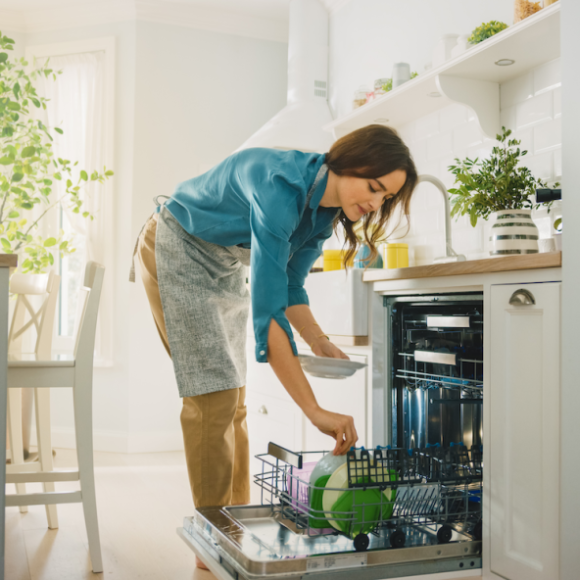
Everyone has a theory on how the dishwasher should be stacked – but many of us are not so knowledgeable about how to keep it clean and running efficiently.
Choice whitegoods expert Ashley Iredale says that sometimes it’s the things you don’t do that can make the biggest difference – to both your dishwasher and what you wash in it.
Here’s what Iredale considers the big dishwasher no-nos: the things he doesn’t do and never will.
1. He never puts the dishwasher tablet in the detergent dispenser
In good news for lazy housekeepers, Ashley says you can dispense with the dispenser – just throw the tablet in the bottom of the dishwasher and you’re good to go. You’ll get the same effect but will have saved yourself approximately 2.5 seconds of cursing at the fiddly closure.
“Detergent dispensers are primarily designed for powdered detergents, and don’t open until after the first rinse cycle – this prevents your powdered detergent from washing down the drain before the wash cycle starts,” says Ashley.
“Tablets, however, are too big to wash away like that, and by having them loose in the tub from the get-go, it gives the dissolvable wrapper a head-start in the initial rinse, so the tablet itself is more readily available from the start of the wash cycle.
“This is especially important if you’re running a quick wash program, where there’s less time for the detergent to work, or if you find the dishwasher tablet’s wrapper hasn’t dissolved by the end of the cycle.”
2. He never pre-rinses the dishes
This one might surprise you, but giving your dishes a quick rinse before stacking them in the dishwasher can actually lead to dirtier, not cleaner, dishes. That’s because pre-rinsing your dishes can effectively trick your dishwasher into thinking your plates are cleaner than they actually are, so it won’t work as hard to wash your dishes.
“By all means, scrape your dishes before putting them in the dishwasher, but there’s no need to rinse – it won’t make your dishes any cleaner and it’ll just use more water,” says Ashley.
“Plus, by rinsing your plates clean before washing, you’re showing a complete lack of faith in your dishwasher’s ability to do the one job you paid all that money for it to do.”
3. He doesn’t put good knives in the dishwasher
If you want to keep slicing, dicing, chopping and julienning, the dishwasher is not the place for your good kitchen knives. Not only can all the bumping and rattling dull your knives’ sharp edges, the harsh chemicals in dishwasher detergent and the hot, humid environment can corrode the high carbon steel in good quality chef’s knives.
“If you’re going to spend money on good knives, don’t chuck them in the dishwasher to save time – they’re a handwash-only item,” says Ashley.
“It’ll actually cost you more time, both in constantly sharpening your knives to restore the sharp cutting edge, and in first aid for the injuries you’ll sustain from trying to cut food with a blunt blade.”
4. He never runs the dishwasher if it’s not completely full
A full dishwasher is an efficient dishwasher, says Ashley. Washing a half-full dishwasher (or half-empty, depending on your worldview!) is inefficient for a number of reasons. Firstly, you’ll be using more water and energy on a plate-by-plate basis – the dishwasher will use around the same amount of electricity and water regardless of how full it is.
Secondly, a full dishwasher dries better. Basically, the crockery heats up from the hot water in the machine, then it holds onto that heat, which helps it to dry. So the more you put in your machine, the more heat, and thus better drying.
5. He doesn’t close the dishwasher door in between washes
Yes, we know, leaving the door open can spoil the look of your otherwise-tidy kitchen. But keeping your dishwasher closed doesn’t give the seals a chance to dry out, which gives mould and other nasty stuff (including the associated bad smells) a chance to take hold.
You don’t need to leave it wide open – just leaving it slightly ajar will do the trick.
“It also pays to wipe your dishwasher’s door seals down with a soft, damp cloth as part of your weekly cleaning routine to remove food scraps and keep the seals in tip-top condition,” Ashley says.

